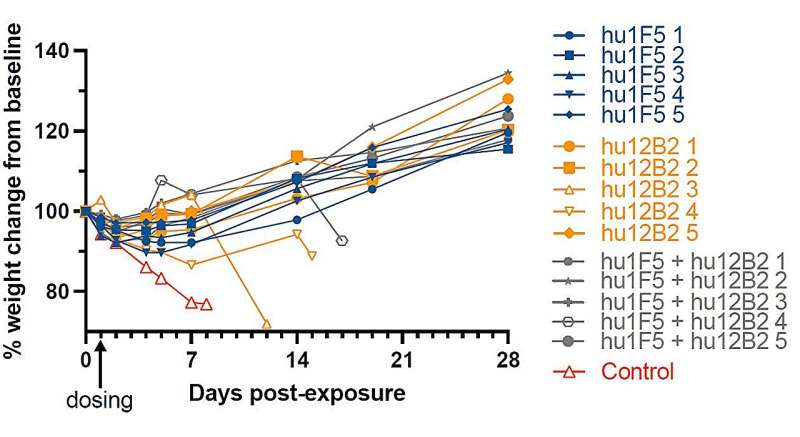June 29, 2024 feature
This article has been reviewed according to Science X's editorial process and policies. Editors have highlighted the following attributes while ensuring the content's credibility:
fact-checked
peer-reviewed publication
trusted source
proofread
Scientists developing a monoclonal antibody to neutralize Nipah virus one of the deadliest zoonotic pathogens

An experimental monoclonal antibody has been engineered to target the deadly Nipah virus, an emerging zoonotic pathogen with a human mortality rate ranging as high as a staggering 90%.
The candidate monoclonal antibody was developed through a joint research project between a San Diego-based biopharmaceutical company and multiple U.S. academic centers that study the most lethal emerging viruses. Urgency underlies the development of therapeutics against a wide range of zoonotic viruses. The emerging pathogens have the potential to spur pandemics—or fall into the hands of malevolent forces that may use them for purposes of bioterrorism.
"No licensed vaccines or therapies exist for patients infected with Nipah virus," writes Dr. Larry Zeitlin, co-founder of Mapp Biopharmaceutical in San Diego and lead author of the new research reported in Science Translational Medicine. "Nipah virus is a highly pathogenic zoonotic paramyxovirus causing regular outbreaks in humans and animals in South and Southeast Asia."
Just like Ebolavirus, SARS, SARS-CoV-2, and Marburg virus, the Nipah pathogen originated in bats. The name Nipah is derived from the name of the Malaysian village where pig farmers were infected in the late 1990s. Measles virus, although not of bat origin, is another member of the paramyxovirus family and stands out as one of the most contagious viruses known to science. While Nipah is less contagious than measles, it is capable of much higher mortality.
People infected with Nipah virus can be afflicted with dangerous respiratory impairment and brain swelling, symptoms that fuel the extraordinary fatality rates. Mortality ranges from a low of 40% to a high of 90%. The virus has been responsible for several relatively recent outbreaks in Bangladesh and India.
Prior to the new research, Zeitlin and colleagues had developed a monoclonal antibody, which they dubbed m102.4. It has the capacity to neutralize Nipah virus and is sometimes administered to patients under compassionate use protocols. Now, Zeitlin and his collaborators have developed an improved monoclonal antibody called hu1F5, which targets the pre-fusion form of the Nipah virus F protein. Scientists have tested the new monoclonal antibody in animal models.
"We hypothesized that a mAb (monoclonal antibody) against the prefusion conformation of the F glycoprotein may confer better protection than m102.4," Zeitlin noted in the report. "To test this, two potent neutralizing mAbs against the Nipah virus F protein, hu1F5 and hu12B2, were compared in a hamster model. Hu1F5 provided superior protection to hu12B2 and was selected for comparison with m102."
In hamsters, the team found that administering hu1F5 one day after infection in hamsters led to 100% survival. It's important to note that hu1F5 also protected African green monkeys from Nipah virus even when given as late as five days after infection. In that arm of the research, all six infected animals survived. Hu1F5 also outperformed the earlier monoclonal antibody, m102.4, which protected only one out of six treated animals from death.
The team also introduced several mutations into the antibody to extend its half-life and reported that the monoclonal antibody that had superior performance in animal testing is progressing toward a phase 1 human clinical trial.
Mapp Biopharmaceutical was founded in 2003 by Zeitlin and Dr. Kevin Whaley. They aimed to develop novel pharmaceuticals for the prevention and treatment of infectious diseases with an emphasis on global health and biodefense.
In May, the company announced collaboration with the Biomedical Advanced Research and Development Authority—BARDA—a division of the U.S. Department of Health and Human Services. That research focuses on a monoclonal antibody against Marburg virus.
In the current study involving the monoclonal antibody against Nipah virus, Zeitlin and colleagues at Mapp Biopharmaceutical worked with scientists from throughout the United States. Collaborators included teams at University of Texas Medical Branch, Galveston National Laboratory; the Department of Pathology, Microbiology and Immunology at Vanderbilt University Medical Center in Nashville, Tennessee; the Department of Biochemistry at the University of Washington in Seattle, and a team from the Department of Microbiology and Immunology at the Uniformed Services University in Bethesda, Maryland.
Zeitlin and the multi-center team, meanwhile, concluded that therapeutic administration of the cross-reactive monoclonal antibody targeting the fusion glycoprotein of Nipah virus protects non-human primates. Results of the animal model research support further development of hu1F5 for human Nipah virus infection.
More information: Larry Zeitlin et al, Therapeutic administration of a cross-reactive mAb targeting the fusion glycoprotein of Nipah virus protects nonhuman primates, Science Translational Medicine (2024). DOI: 10.1126/scitranslmed.adl2055
© 2024 Science X Network


















